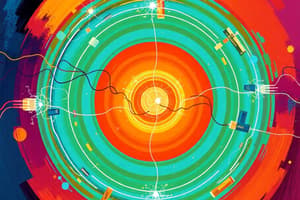Podcast
Questions and Answers
What is defined as the capacity to perform work in physics?
What is defined as the capacity to perform work in physics?
- Kinetic energy
- Energy (correct)
- Electricity
- Potential energy
In the context of energy, what is converted into potential energy when a ball is thrown into the air?
In the context of energy, what is converted into potential energy when a ball is thrown into the air?
- Nuclear energy
- Chemical energy
- Thermal energy
- Kinetic energy (correct)
What is the flow of electric charge known as?
What is the flow of electric charge known as?
- Potential
- Electricity (correct)
- Energy
- Kinetic energy
Which form of energy is typically associated with motion?
Which form of energy is typically associated with motion?
How is electric current generated in a conductor?
How is electric current generated in a conductor?
Which source can be harnessed to produce electricity according to the text?
Which source can be harnessed to produce electricity according to the text?
What is a primary energy source that fuels the production of electricity through combustion?
What is a primary energy source that fuels the production of electricity through combustion?
Which carbon compound is a common carbohydrate that serves as a source of energy for living organisms?
Which carbon compound is a common carbohydrate that serves as a source of energy for living organisms?
What role do carbon compounds with nitrogen, such as ammonia and proteins, play in the context of energy-storage technologies?
What role do carbon compounds with nitrogen, such as ammonia and proteins, play in the context of energy-storage technologies?
Which of the following is NOT classified based on functional groups as alkanes, alkenes, or alkynes?
Which of the following is NOT classified based on functional groups as alkanes, alkenes, or alkynes?
What type of compounds are composed solely of hydrogen and carbon?
What type of compounds are composed solely of hydrogen and carbon?
Which technology has been developed based on the understanding of electricity flow through circuits?
Which technology has been developed based on the understanding of electricity flow through circuits?
Flashcards are hidden until you start studying
Study Notes
Exploring the World of Physics: Energy, Electricity, and Carbon Compounds
Physics, the foundation of our understanding of the natural world, encompasses an array of interconnected concepts, including energy, electricity, and the behavior of carbon compounds. In this exploration, we'll delve into these intriguing subtopics, unraveling their fundamental principles and applications.
Energy
Energy, a fundamental concept in physics, is defined as the capacity to perform work. It comes in various forms such as kinetic (motion), potential (stored), thermal (heat), chemical, nuclear, and electromagnetic energy. To grasp the concept of energy, let's consider a simple example: a ball being thrown into the air. As it ascends, its kinetic energy is converted into potential energy. Once the ball reaches its peak height, the potential energy is then converted back into kinetic energy, causing it to fall back to the ground.
Electricity
Electricity, one of the most significant and widely used forms of energy, results from the flow of electric charge. Electric current is generated when charged particles, typically electrons, flow through a conductor. The magnitude of the current is determined by the number of electrons passing a specific point per unit time. Electricity can be produced harnessing various sources such as water (hydroelectric), wind (wind turbines), or through chemical reactions (fossil fuels, biomass). It is then distributed via an intricate network of transmission lines, transformers, and sub-stations before reaching our homes and offices.
Carbon Compounds
Carbon compounds, a central topic in chemistry, are essential to our understanding of electricity and energy production. Carbon plays a unique role in forming a wide variety of compounds through its ability to form chemical bonds with other elements, most notably hydrogen, oxygen, and nitrogen.
The most abundant carbon compounds are the hydrocarbons. Composed solely of hydrogen and carbon, hydrocarbons can be classified as alkanes, alkenes, and alkynes based on their functional groups. Some hydrocarbons, particularly coal and petroleum, serve as primary energy sources, fueling the production of electricity through combustion and being the basis for the creation of other valuable chemicals.
In contrast, carbon compounds containing oxygen, such as alcohols, ethers, and carboxylic acids, play a crucial role in energy storage and conversion. For instance, glucose, a common carbohydrate, is a source of energy for living organisms, while the bond energy released by the combustion of glucose fuels our power plants.
Moreover, carbon compounds with nitrogen, such as ammonia, urea, and proteins, are essential for life and contribute to the development of energy-storage technologies, such as fuel cells and batteries.
Applications
Understanding these fundamental concepts has paved the way for several groundbreaking technologies and practical applications. For example, the principles of energy conversion and storage, introduced above, have led to the development of batteries, fuel cells, and solar panels. Similarly, our understanding of electricity and its flow through circuits has resulted in the invention of electric motors, transformers, and generators.
Carbon compounds, meanwhile, have propelled the development of numerous industries, from petroleum and coal-based energy production to the creation of life-saving drugs, fertilizers, and materials.
Conclusion
In short, physics, with its emphasis on energy, electricity, and carbon compounds, provides the foundation for our understanding of the natural world and the development of technologies that shape our daily lives. As we continue to explore and uncover new insights, we can expect these fundamental concepts to drive progress in science, technology, and innovation. Khan Academy. (2020). Energy. Retrieved from https://www.khanacademy.org/science/physics/force-and-motion/energy/a/what-is-energy Khan Academy. (2020). Electricity. Retrieved from https://www.khanacademy.org/science/physics/circuit-analysis-and-electricity/voltage-current-and-resistance/a/electricity Khan Academy. (2020). Organic Chemistry. Retrieved from https://www.khanacademy.org/science/chemistry/organic-chemistry/alcohols-and-ethers/a/organic-chemistry-intro NASA. (2020). Energy. Retrieved from https://www.nasa.gov/audience/forstudents/5-8/features/nasa-knows/what-is-energy.html Khan Academy. (2020). Chemistry. Retrieved from https://www.khanacademy.org/science/chemistry/organic-chemistry
Studying That Suits You
Use AI to generate personalized quizzes and flashcards to suit your learning preferences.




